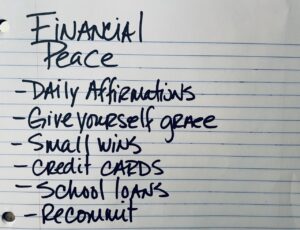
Maintaining My Financial Wellness
Financial Wellness is important. 2020-21 has given me much
In this reposted September 2015 article, the Frugal Feminista offers advice on how to break bad spending habits and how to begin accumulating wealth for the long term. By Kara I. Stevens on January 3, 2020
You did everything that you were supposed to do. College degree. Good job. Benefits. Yet it is still difficult for you to get a handle on your finances.
Lately, you might have found yourself asking, “What is at the root of my money problems?” and “What can solve them?” Luckily, the answer to both is YOU!
The impulse buys, lack of saving, frequent trips to the ATM, unwise loans, late payments, postponed meetings with your financial adviser and other financial mishaps can directly be attributed to your underlying and subconscious values, understanding and beliefs about money. The good news is that you can redefine your money mindset through these good old-fashioned soul-searching guidelines and wealth-accumulation tips.
1. Figure out why you spend.
The survival of a capitalist economy relies on high levels of consumption. Big business relies on the media to assist in achieving this end. Newspapers, magazines, television, and radio bombard consumers with images of products, services and goods in an effort to convince them that they would be happier, more interesting, smarter, and sexier once they purchase, invest, and consume. Essentially, the media attempts to reprogram the average consumer to believe that material items will make them complete and at peace.
So before you go on your next shopping spree, here are some questions to ask yourself about your sense of worth as it relates to the acquisition of material items:
Am I not as good as (person’s name) because she/he can afford (material item)?
Do I shop because I think material items will make the people that I want to attract like me more?
Do I feel empty when I can’t buy something new or expensive?
Does buying expensive things make me feel better than others that can’t afford to buy those things?
2. Make it a group effort.
Tell your closest friends about your financial recovery plans, then get them involved. You are probably not the only one going through this transition, and the support of like-minded people will optimize your chances of successfully attaining your goals.
3. Live at home for as long as you can.
Are you eager to move out to show (or convince) your friends that you have made it by getting your own place? Instead of paying rent or splitting it with roommates, stay at home until you have enough saved up to purchase your own residence. Often, those eager to move out without a clear financial plan, end up moving back home. This concept is not new to the Black community. It is part of our history. Throughout the Caribbean and the Americas, newly freed African slaves formed communities, collectives, and extended living kinships as a way to pool resources, reduce expenses, share advice and protect one another from external threats. This is a timeless system and approach.
4. Rethink the big wedding celebration for your fifth anniversary, not your first.
This is not to say that being newly married is not something to celebrate, because it is! However, what is greater than being married for one year is being happily married for five years and even better, 10 or 20 years?! Too many young couples go into debt preparing themselves for one day and do not plan for the everyday financial trials of marital partnership. At least with this approach, there is something to look forward to every five years and you’ll be in more of a financial position to pay for it.
5. Prioritize your debt.
Open up the bills and get a reality check. See how much you really owe. It may seem overwhelming, but this is the first and most important step in getting you toward financial freedom. After that, start paying. The two most popular strategies for tackling debt are the “high-interest” approach and the “smallest balance” approach. With the former, you pay your bills with the highest interest rates first. The rationale behind this strategy is that you get the most financially draining bill out of the way first. With the latter, you pay your bills with the smallest balance first based on its psychological impact. There is an immediate sense of accomplishment and progress when one bill is completely accounted for. One is no better than the other. Use whichever makes you feel as if you are making the most progress toward your $0-balance dream.
6. Figure out how much you are spending, then create a monthly savings plan.
There is no way to get around it. Without a financial blueprint, you will make little headway in securing your financial freedom. A basic budget begins with dividing your expenses into two broad categories: fixed expenditure such as housing, transportation, food, insurance, tuition, etc. and variable expenditure like standing nail/salon appointments, gym memberships and entertainment.
7. Create a Financial Freedom Fund (FFF) bucket.
It is your choice; It can be an old vase, an old wastepaper basket or a mini-trash can. Label it “My Financial Freedom Fund.” Decorate it. Start by throwing all of your loose change in there at the end of each day. If you live in a house, have a few FFFs around high-traffic areas such as kitchens and bedrooms. When necessary, combine all of the money into the central FFF. After it has reached its capacity, redeem your coins for cash. You may not think so, but those pennies add up. This extra money could be used to pay off some debt or that could be air-marked for travel, education or any other well-deserved guilty pleasure.
8. Get a hustle (or maybe even two or three).
Use your creativity to increase your income. If you are good at organizing, place an ad to clean out garages, run errands and organize closets and yard sales throughout the neighborhood. If you have a computer and can type pretty quickly, solicit editing/typing/revising gigs. Clean out your closets and put those items up for sale at a garage sale, eBay or on consignment at a local secondhand store. Good with pets and plants? Walk and water them for a fee!
9. Go shopping in your closets before you make your way to the mall.
If you have a problem with shopping and think that you need a new black pair of slacks or two-inch pump, check your closets. You’ve probably bought them, maybe even twice. If not, check in your best friend’s closet.
10. Pick up a book and empower yourself about money.
Read and internalize straightforward, practical advice from African-American personal finance experts like Michelle Singletary, Lynette Khalfani, and Glenda Bridgforth. These women are present-day pioneers in counseling and educating the Black community about their financial hygiene.
Connect with Kara on Twitter @frugalfeminista. Learn more about “The Frugal Feminista” at www.thefrugalfeminista.com. Download her free Ebook, The 5-Day Financial Reset Plan: Eliminate Debt, Know Your Worth, and Heal Your Relationship With Money in Just 5 Days.

Financial Wellness is important. 2020-21 has given me much

How much I can commit to? Where will I

MrAllen ended our last call with early discussions of

In this reposted September 2015 article, the Frugal Feminista

There are so many facets of life that can be defined as sexy. Being sexy starts with you. Staying connected, exercising, setting boundaries, being mindful of your mental health will enhance your overall presence